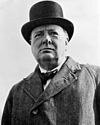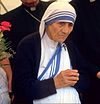Honorary citizen of the United States

A person of exceptional merit, generally a non-United States citizen, may be declared an honorary citizen of the United States by an Act of Congress or by a proclamation issued by the President of the United States, pursuant to authorization granted by Congress.
Eight people have been so honored, six posthumously, and two, Sir Winston Churchill and Mother Teresa, during their lifetimes.
Recipients
| # | Name | Image | Award date | Information |
|---|---|---|---|---|
| 1 | Sir Winston Churchill |  |
1963 | Prime Minister of the United Kingdom[2]:{{{3}}}[3] |
| 2 | Raoul Wallenberg |  |
1981 (posthumous) |
Swedish diplomat who rescued Jews from the Holocaust[4] |
| 3 | William Penn |  |
1984 (posthumous) |
Founder of the Province of Pennsylvania[5] |
| 4 | Hannah Callowhill Penn |  |
1984 (posthumous) |
Second wife of William Penn, administrator of the Province of Pennsylvania[5] |
| 5 | Mother Teresa |  |
1996 | Catholic nun of Albanian ethnicity and Indian citizenship, who founded the Missionaries of Charity in Calcutta[6] |
| 6 | Gilbert du Motier, Marquis de Lafayette | 2002 (posthumous) |
A Frenchman who was an officer in the American Revolutionary War | |
| 7 | Casimir Pulaski | 2009 (posthumous) |
Polish military officer who fought on the side of the American colonists against the British in the American Revolutionary War; member of the Polish–Lithuanian Commonwealth nobility, politician who has been called "The Father of the American Cavalry"[7][8][9][10] | |
| 8 | Bernardo de Gálvez y Madrid, Viscount of Galveston and Count of Gálvez |  |
2014 (posthumous) |
A Spaniard who was a hero of the American Revolutionary War who risked his life for the freedom of the United States people and provided supplies, intelligence, and strong military support to the war effort, who was wounded during the Siege of Pensacola, demonstrating bravery that forever endeared him to the United States soldiers.[11] The King of Spain Carlos III granted him the right to the motto YO SOLO (I ALONE) for his coat of arms |
For Lafayette and Mother Teresa, the honor was proclaimed directly by an Act of Congress. In the other cases, an Act of Congress was passed authorizing the President to grant honorary citizenship by proclamation.
Legal issues
What rights and privileges honorary citizenship bestows, if any, is unclear. According to State Department documents, it does not grant eligibility for United States passports.[1]

In the case of Lafayette, he did not receive honorary citizenship of the United States until 2002, but did become a natural-born citizen during his lifetime. On 28 December 1784, the Maryland General Assembly passed a resolution stating that Lafayette and his male heirs "forever shall be...natural born Citizens" of the state.[12] This made him a natural-born citizen of the United States under the Articles of Confederation and as defined in Section 1 of Article Two of the United States Constitution.[13][14][15][2] Lafayette boasted in 1792 that he had become an American citizen before the French Revolution created the concept of French citizenship.[16] In 1803, President Jefferson wrote him he would have offered to make him Governor of Louisiana, had he been "on the spot".[17] In 1932, descendant René de Chambrun established his American citizenship based on the Maryland resolution,[18][19] although he was probably ineligible as the inherited citizenship was likely only intended for direct descendants who were heir to Lafayette's estate and title.[20]
Honorary citizenship should not be confused with citizenship or permanent residency bestowed by a private bill. Private bills are, on rare occasions, used to provide relief to individuals, often in immigration cases, and are also passed by Congress and signed into law by the President. One such statute, granting Elián González U.S. citizenship, was suggested in 1999, but was never enacted.[21]
See also
References
- ↑ 1.0 1.1 Lua error in package.lua at line 80: module 'strict' not found.
- ↑ 2.0 2.1 Lua error in package.lua at line 80: module 'strict' not found.
- ↑ Lua error in package.lua at line 80: module 'strict' not found.
- ↑ Lua error in package.lua at line 80: module 'strict' not found.
- ↑ 5.0 5.1 Lua error in package.lua at line 80: module 'strict' not found.
- ↑ H.J. Res. 191 (Pub.L. 104–218, 110 Stat. 3021, enacted October 1, 1996)
- ↑ Lua error in package.lua at line 80: module 'strict' not found.
- ↑ Lua error in package.lua at line 80: module 'strict' not found.
- ↑ Lua error in package.lua at line 80: module 'strict' not found.
- ↑ H.J. Res. 26 (S.J. Res. 12) (Pub.L. 111–94, 123 Stat. 2999, enacted November 6, 2009)
- ↑ Lua error in package.lua at line 80: module 'strict' not found.
- ↑ Lafayette again became an honorary citizen of Maryland in 1823, as well as of Connecticut the same year.
- ↑ Lua error in package.lua at line 80: module 'strict' not found.
- ↑ Lua error in package.lua at line 80: module 'strict' not found.
- ↑ Lua error in package.lua at line 80: module 'strict' not found.
- ↑ Lua error in package.lua at line 80: module 'strict' not found.
- ↑ Lua error in package.lua at line 80: module 'strict' not found.
- ↑ Lua error in package.lua at line 80: module 'strict' not found.
- ↑ Lua error in package.lua at line 80: module 'strict' not found.
- ↑ Lua error in package.lua at line 80: module 'strict' not found.
- ↑ Lua error in package.lua at line 80: module 'strict' not found.